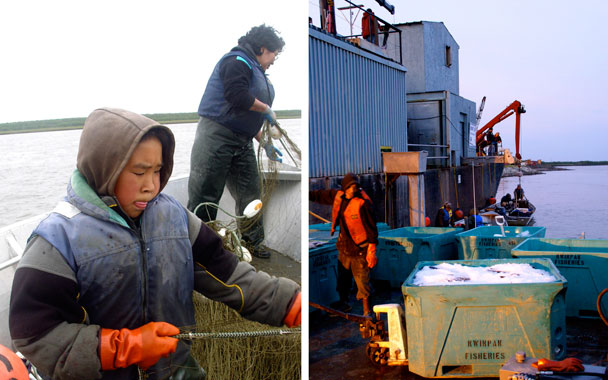Life is not good here. The fish are not running. And things are going from bad to worse. Due to the extremely low king return, fishing anything is entirely and wholly out of the question.”
That dispatch was sent early this week from Jack Schultheis, operations director of Kwik’pak Fisheries, a processor of salmon caught out of the lower Yukon River in remote western Alaska, to Jon Rowley, who handles communications for the small, Eskimo-owned company. (Rowley is also a Gourmet contributing editor.)
In the last year or so, Yukon River kings have become the “new” Copper River salmon, the most sought-after catch-of-the-day at top-end seafood restaurants because of their unusually high oil content. For a while, it looked like everyone was winning. The salmon were moist, tasty, and healthful. Exports to the Lower 48 provided vital income (sometimes the only income) for struggling native Yup’ik fishing families that use earnings from the fishery to purchase gasoline (currently $7.60 a gallon up there) for necessary subsistence activities such as hunting moose and gathering berries. And, better yet, the stocks were sustainably managed.
Then disaster struck. So few king salmon returned to the Yukon River this month that fishery managers ordered drastic cuts to subsistence fishing. There will be no commercial harvest.
“It’s the best fish in the sea, eating-wise,” says Rowley, who should know. He was the person who introduced Copper River salmon to the outside world in the 1980s. “Yukon kings were just beginning to get a reputation as the ne plus ultra of fish, and the plug got pulled.”
Although there has been no official explanation for the collapse, Rowley doesn’t hesitate to point his finger at what he feels is responsible: The billion-dollar Bering Sea pollock fishery. More than 100 giant trawlers drag the waters off the Yukon River for pollock, but their nets intercept migrating kings. The salmon, so valuable to the Yup’iks, are illegal for the trawlers to sell, so they get dumped back into the sea as garbage—dead. Last year, this “by-catch” amounted to 120,000 kings (and that’s just what was documented, the real number could be much higher). That was more than twice the average by-catch of the previous five seasons—and four times the 30,000 fish Kwik’pak sold in 2007.
Even before the current tragedy, the pollock fishery, America’s largest by volume (you've probably encountered pollock in fish sticks), had become the subject of heated debate in marine conservation circles. It is rated as sustainably managed by the prestigious Marine Stewardship Council (MSC), and Seafood Watch rates pollock as one of the “Best” species to consume. Greenpeace, however, rates it as one of the very worst, citing by-catch as a major issue. I have great respect for both Seafood Watch and the MSC, which is currently in the process of reassessing pollock, but this time I have to go with Greenpeace. “I don’t know how the MSC can re-certify the pollock fishery given the salmon by-catch issue,” says Rowley. “And the North Pacific Fishery Management Council, which is supposed to regulate things up there, is simply not doing its job.”
If there is a glimmer of good news in this sad tale, it’s that Rowley is still doing his job, which is to get the word out about great fish. A run of “fall” chum salmon up the Yukon begins in July. Like their king cousins, the river’s chum boast uncommonly high oil levels. (Vast energy stores are necessary to fuel Yukon salmon’s 2,000-mile migration to upstream breeding waters.) And, says Rowley, they, too, taste great—and they are abundant. “They’re just waiting to be discovered. I’m going to try to get something going with that,” he says.
If the past is any indication, we’ll all be hearing about the wonders of Yukon River fall chum before the summer is out. The fortunate among us will get to taste one, too.
[Update: A point of clarification is in order. When Rowley told me that the Northern Pacific Fishery Management Council was not doing its job, he was only referring to the specific issue of salmon by-catch by pollock trawlers.
He believes that the council does a good job with most of the fisheries they oversee. Sorry for any confusion.]




 Pinterest
Pinterest


